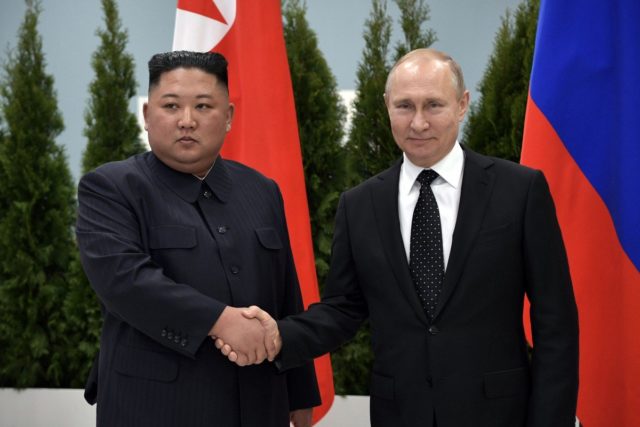
Putin and Kim’s Vladivostok Summit: What Did We Learn?
Publication: Eurasia Daily Monitor Volume: 16 Issue: 65
By:

Although North Korean dictator Kim Jong-un’s travels inevitably attract a lot of media attention due to his country’s inherent secrecy and opacity, expectations were not high for the summit with Vladimir Putin, on April 25, in Vladivostok (Kommersant, April 25). And to a large degree, the results of that face-to-face meeting appeared to the media to have been “anticlimactic” (Asia Times, April 25). Nevertheless, what was intriguing is that the two spoke far longer than they had originally been scheduled to (see EDM, April 29), and their conversation, according to Kim, was “candid and meaningful” (South China Morning Post, April 25)—a notable characterization that Communist and post-Communist leaderships often utilize as a diplomatic euphemism for disagreement. Putin, for his part, clearly felt Kim to be an interesting and substantive interlocutor and played down any differences, even though no agreements were signed. Therefore, it is premature to dismiss the Russian–North Korean summit so quickly.
It is true that Putin’s subsequent press conference (Kim declined to face journalists after talking with his Russian counterpart) revealed few surprises. According to the Kremlin leader, Kim had asked him to intercede on North Korea’s behalf with the United States. And clearly, he requested economic aid (flour and agricultural assistance) to address his country’s systemic food problems as well as discussed the issue of North Korean migrant labor in Russia. Moscow has had to send most of these 40,000 guest workers home due to United Nations sanctions, further harming the North Koran economy. Moscow, for its part, again raised the issues of a natural gas pipeline from Siberia through the Koreas, the 125-year-old proposal to build a Trans-Siberian–Trans-Korean railway, plus the idea of supplying power from Siberia to both Koreas and wider Northeast Asia. Russia has also long been interested in obtaining access to North Korean rare earth metal deposits. But obviously, neither side committed to anything. Putin did, however, tell reporters that he was prepared to brief the Chinese and US governments on the substance of his discussions with Kim because there were “no secrets” (Kremlin.ru, April 25).
On the key issue of denuclearization, there also were evidently no major surprises. Russia formally opposes North Korea’s nuclear weapons program. And yet, Russian analysts and apparently the government believe that—as one Russian expert told a US audience in November 2018 (in an off-the-record discussion attended by this author)—there are no concessions that Washington can make that would induce Pyongyang to denuclearize. Instead these analysts and officials—and presumably Putin, too—maintain that it is necessary to have a long period of gradual denuclearization in return for confidence-building measures and solid security guarantees. Indeed, Putin, as he has done repeatedly in the past, once again advocated “multilateral security guarantees” for North Korea. Yet, it clear that the Donald Trump administration is in no mood to consider such a mechanism without a credible and visible commitment by Pyongyang to give up its nuclear stockpile (Kremlin.ru, April 25).
This advocacy of multilateral security guarantees is a long-standing Russian position, even though some Western media thought it was news. Indeed, Moscow has long taken such a stance because it is the only way it can be taken seriously as a major player in the resolution of the issues connected with North Korea’s nuclear program. Another unremarkable aspect of the conference was the fact that China welcomed the summit (CGTN, April 24). And finally, as could also have been expected, there was no sign that Russia sought in any way to diverge from or diminish China’s role in the process or standing vis-à-vis North Korea.
Nevertheless there was at least one potentially new—and even possibly discordant—element in the recent Russian–North Korean talks. While meeting with his counterpart, No Kwang-Chol, Defense Minister Sergei Shoigu stated that Russia was interested in expanding defense cooperation with North Korea (Interfax, April 24). Normally, this means arms sales or joint exercises or both. The two sides had, in fact, attempt to revive such cooperation back in 2011, immediately after then–Russian president Dmitry Medvedev’s summit with the late Kim Jong-il; but those efforts ultimately went nowhere. If Russia were to engage in joint military drills with North Korea—alone or together with China—or to sell weapons to Pyongyang, that would effectively confirm Moscow’s fundamental opposition to US policy on North Korea, despite the fact that Putin stated Moscow and Washington actually had some shared interests here, i.e., denuclearization and peace (Kremlin.ru, April 25). That outcome would disqualify Moscow from being able to propose anything credible to Washington. But it remains to be seen just what form this bilateral military cooperation will actually take.
Therefore, although some observers have regarded this meeting as anticlimactic and lacking any major developments, it would be wise to refrain from drawing such conclusions prematurely. The Russian–North Korean relationship appears to be somewhat fluid and undefined at this point, encouraging closer scrutiny about where it is going and to what degree novel developments in “military cooperation” represents a departure from what has already come to pass.



